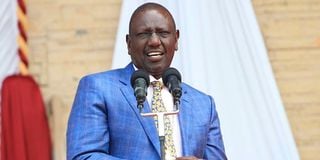Ruto moves to block IEBC commissioners from Supreme Court sessions

President-elect William Ruto.
President-elect William Ruto has asked the Supreme Court to bar six members of the electoral commission from participating in the presidential election petition challenging his win.
In an application that he wants certified urgent, Dr Ruto says only the Commission itself and chairman Wafula Chebukati should participate in the hearings scheduled to start on Wednesday.
“The recent General Election was held by the Independent Electoral and Boundaries Commission (IEBC) and not the individual commissioners,” says Dr Ruto in court papers.
He is urging the apex court to strike off commissioners Abdi Guliye, Boya Molu, Juliana Cherera, Francis Wanderi, Irene Masit and Justus Nyang'aya from the petition and any pleadings filed by any of them be expunged from the court’s record.
Through his lawyer Prof Kithure Kindiki, Dr Ruto says IEBC Commissioners were wrongly sued by petitioners led by Azimio la Umoja leader Raila Odinga, and that their involvement creates a second tier of petitioners.
With their participation in the suit, the lawyer says Dr Ruto’s right to fair trial will be compromised. Prof Kindiki adds that some of the commissioners are at loggerheads with the chairman Wafula Chebukati.
“They intend to use their response to advance accusations, new claims and innuendoes solely intended to prejudice Dr Ruto,” he says.
He argues that based on provisions of Article 140 of the Constitution, the members of IEBC cannot be respondents in the suit and their suing introduces a second tier of petitioners in court.
“In the true sense, Mr Molu, Prof Guliye, Ms Cherera, and Mr Nyang’aya are second tier petitioners so enjoined to enable the petitioners to have another set of petitioners albeit classified as respondents,” argues Prof Kindiki.
He adds that their participation will deprive Dr Ruto an opportunity to respond to any of their claims which action would violate his rights.
The application is supported by an affidavit filed by former Turkana governor Josphat Nanok, who was also his Deputy Chief agent during tallying of presidential votes.
According to Mr Nanok, it is incomprehensible why the presidential election petitioners sued the individual commissioners in their individual names.
“Article 140 of the Constitution envisages a precise and concise issue that challenges the election of the President elect and deputy president elect. Complaints between commissioners should not be included in such a petition,” says Mr Nanok.
He claims that he is aware commissioners Mr Molu, Prof Guliye, Ms Cherera, and Mr Nyang’aya are uncomfortable with the electoral victory of Dr Ruto.
“Indeed these commissioners have publicly stated their opposition to Dr Ruto’s victory.
Accordingly, the four commissioners are in true sense petitioners and proxies of the Petitioners ingeniously included to be part of the Respondents so as to compromise Dr Ruto’s defence.
Consequently, it is prudent that these unnecessary parties be struck out from this petition and any pleadings filed by them should be expunged from the record,” he states.





